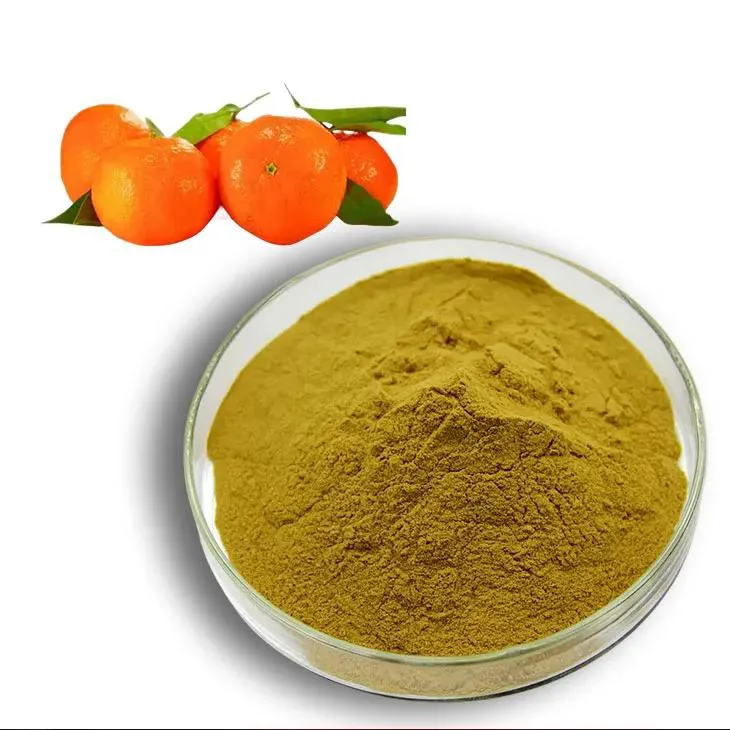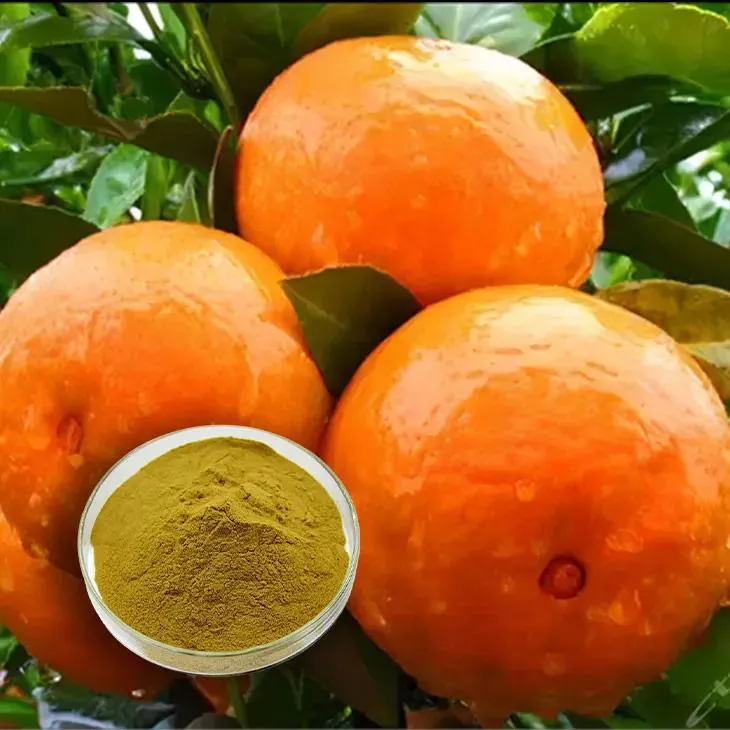- 0086-571-85302990
- sales@greenskybio.com
Citrus Bioflavonoids in Foods: A Comprehensive Exploration of Their Presence and Benefits
2025-09-24

Bioflavonoids, also known as flavonoids, are plant-derived compounds associated with various health-enhancing properties. Among them, citrus bioflavonoids stand out due to their abundance in certain fruits and their powerful antioxidant, anti-inflammatory, and circulatory system benefits. This article delves into what citrus bioflavonoids are, identifies the foods that contain them, and explores their associated health benefits through scientific insights and nutritional perspectives.
What Are Citrus Bioflavonoids?
Citrus bioflavonoids are a subset of flavonoids found predominantly in citrus fruits. These compounds are responsible for the vibrant colors in fruits and have protective properties against environmental stressors. Structurally, citrus bioflavonoids are part of the larger polyphenol family and include hesperidin, rutin, naringin, Quercetin, Diosmin, and hesperetin among others. They have been widely studied for their ability to support cardiovascular health, immune function, and overall well-being.

Foods Rich in Citrus Bioflavonoids
Citrus bioflavonoids can be found in a variety of foods, primarily within the citrus family. Below, we explore the specific foods rich in these beneficial compounds:
Oranges: Perhaps the most well-known source of citrus bioflavonoids, oranges are rich in hesperidin and narirutin. These compounds are chiefly located in the peel and the inner white pulp of the fruit, thus highlighting the benefits of consuming the whole fruit versus just juice.
Grapefruits: Grapefruits, particularly the pink and red varieties, contain high levels of naringin and naringenin, known for their antioxidant effects. Additionally, these fruits play a role in cholesterol reduction and improving metabolic health.
Lemons: Known for their acidic juice, lemons are a robust source of flavonoids like eriocitrin and hesperidin. These compounds contribute to the prevention of oxidative stress and support detoxification processes in the liver.
Limes: Limes share many of the bioflavonoid characteristics of lemons, with particularly high concentrations of hesperidin. They are celebrated not only for culinary applications but also for their health benefits.
Tangerines: A close relative of the orange, tangerines contain abundant flavonoids such as tangeretin and nobiletin, which have been shown to promote healthy cholesterol levels and offer potential anticancer activities.
Pomelos: This large citrus fruit is less commonly consumed but provides an abundance of diverse flavonoids similar to its citrus counterparts. Pomelos are particularly noted for their high vitamin C content as well.
Kumquats: Though not as widely recognized, kumquats offer an exceptional dose of bioflavonoids, especially concentrated in their edible peel. They provide robust support against cellular inflammation and contribute to improved digestion.
Besides direct sources, citrus bioflavonoids can also be traced in certain supplements or extracts derived from these fruits, aimed at boosting their consumption in populations with limited access to natural sources.

Health Benefits of Citrus Bioflavonoids
Research consistently shows that citrus bioflavonoids play a vital role in promoting health by combating oxidative stress, enhancing microcirculation, and exhibiting anti-inflammatory effects. The following sections shed light on these capabilities:
Antioxidant Properties: Citrus bioflavonoids are potent antioxidants, which means they can neutralize free radicals and reduce oxidative damage in the body. This function is crucial in minimizing the risk of chronic diseases such as cancer and heart disease. Hesperidin, for instance, has been researched extensively for its capacity to bolster cell defense mechanisms.
Cardiovascular Health: Regular consumption of citrus bioflavonoids may lower the risk of cardiovascular diseases. Naringin and hesperidin demonstrate an ability to reduce cholesterol levels and improve blood vessel function. Their role in enhancing blood flow and maintaining arterial flexibility is well-documented.
Anti-inflammatory Effects: Chronic inflammation is linked to numerous health issues, including arthritis and metabolic syndrome. Citrus bioflavonoids possess anti-inflammatory properties that help mitigate these conditions. Quercetin, a bioflavonoid found in citrus fruits, significantly reduces markers associated with inflammation and oxidative stress.
Immune System Support: Citrus bioflavonoids enhance immune function through various pathways, including the modulation of intestinal microflora and protection against pathogens. Enhanced phagocytosis and natural killer cell activity offer critical support for the immune response.
Cancer Prevention: Bioflavonoids like naringenin and Quercetin have been associated with cancer-preventive properties due to their ability to induce cancer cell apoptosis and inhibit tumor growth. These findings underline the potential of citrus bioflavonoids as complementary agents in cancer therapy.
Metabolic Syndrome and Weight Management: Studies indicate that citrus bioflavonoids aid in the management of metabolic syndrome by regulating glucose levels, enhancing lipid metabolism, and supporting weight management. Nobiletin from tangerines, for example, shows promise in preventing obesity-related syndromes.
Liver Health: The detoxifying properties of citrus bioflavonoids contribute to improved liver function. They support liver clearance and protect from hepatic disorders, providing further reasons to integrate citrus fruits into the diet.

Conclusion
The benefits of citrus bioflavonoids make them an indispensable component of a balanced and nutritious diet. As research deepens our understanding of these compounds, their diverse roles in promoting health become ever more evident. From supporting cardiovascular health to acting as antioxidants, the bioflavonoids present in citrus fruits offer an array of benefits that underscore the importance of incorporating these fruits into daily nutrition. As citrus popularity continues to rise worldwide, so too will the knowledge and utilization of their exceptional bioflavonoids, paving the way for healthier lifestyles anchored in the natural bounty of citrus.
Green Sky Bio provides the best extracts and supplements. It is a Chinese self-developed brand that is trustworthy! Welcome to email us to inquire about our products.
- ▶ Hesperidin
- ▶ Citrus Bioflavonoids
- ▶ Plant Extract
- ▶ lycopene
- ▶ Diosmin
- ▶ Grape seed extract
- ▶ Sea buckthorn Juice Powder
- ▶ Fruit Juice Powder
- ▶ Hops Extract
- ▶ Artichoke Extract
- ▶ Mushroom extract
- ▶ Astaxanthin
- ▶ Green Tea Extract
- ▶ Curcumin
- ▶ Horse Chestnut Extract
- ▶ Other Product
- ▶ Boswellia Serrata Extract
- ▶ Resveratrol
- ▶ Marigold Extract
- ▶ Grape Leaf Extract
- ▶ New Product
- ▶ Aminolevulinic acid
- ▶ Cranberry Extract
- ▶ Red Yeast Rice
- ▶ Red Wine Extract
-
Coix Seed Extract
2025-09-24
-
American Ginseng Root Extract
2025-09-24
-
Ginseng Root Extract
2025-09-24
-
Maitake Mushroom Extract
2025-09-24
-
Baicalin
2025-09-24
-
Lemon Juice Powder
2025-09-24
-
Beetroot juice Powder
2025-09-24
-
Red Date Extract
2025-09-24
-
Jujube Extract
2025-09-24
-
Citrus Aurantium Extract
2025-09-24





















